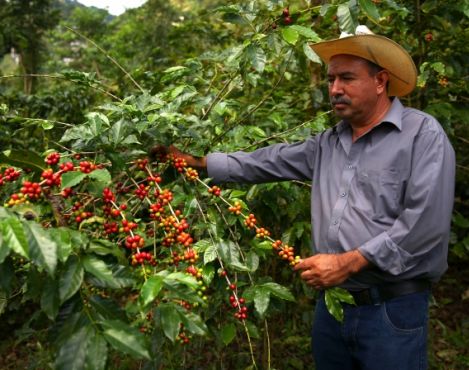SEATTLE, 2015-12-3 — /EPR Retail News/ — Conservation International, in partnership with Starbucks and other industry leaders, announced a call to action to make coffee the first sustainably sourced agricultural product in the world.
Today’s launch of the Sustainable Coffee Challenge, at the U.N. climate negotiations in Paris, comes as ministers gather to write a new climate agreement and as momentum builds for businesses to take direct action to combat climate change.
Currently nearly half of the world’s coffee is being produced according to a sustainability standard, a figure that does not yet account for a number of recent significant investments made by the sector to support farmers in their transition to more sustainable practices. Yet only 12 percent was sold as sustainable coffee in the market.
“We need a common definition of sustainability for the coffee sector,” said Peter Seligmann, chairman and ceo of Conservation International (CI). “This will require commitments by roasters to support increased demand for sustainability. It will also require improved measurement of how far the sector has come in the sustainability journey and just how far we have to go.”
Ensuring Farmer and Family Livelihoods for Generations to Come
The Sustainable Coffee Challenge will convene industry and conservation partners to develop a common framework for sustainability in the coffee sector.
“The longevity of the coffee industry is directly linked to the social, economic and environmental conditions of coffee communities around the world, and at Starbucks we are committed to sourcing all of our coffee in the most ethical way possible that is good for the planet,” said Craig Russell, executive vice president, Starbucks Global Coffee. “We are proud to be a part of the Sustainable Coffee Challenge, a call to action for the industry focused on creating meaningful and lasting solutions to ensure farmer and family livelihoods for generations to come.”
The Sustainable Coffee Challenge comes at a time when nearly every major coffee producing region of the world is feeling the impacts of climate change. As demand increases – with consumers drinking 600 billion cups of coffee every year – warming temperatures, drought and changing weather patterns are impacting coffee production.
In addition to stimulating economic development across the industry, the effort will benefit the lives of 25 million coffee producers, the majority of whom are small-scale farmers. The Sustainable Coffee Challenge will also provide environmental benefits, including the conservation of vital forests that help fight climate change by storing carbon dioxide from the atmosphere and protection of freshwater resources.
CI kicks off the challenge with Starbucks and these key partners: Specialty Coffee Association of America; IDH the Sustainable Trade Initiative; 4C Association; Allegro Coffee Company; Ceres; Committee on Sustainability Assessment; Counter Culture Coffee; ECOM Agroindustrial Corp. Ltd.; Finance Alliance for Sustainable Trade; Humanist Institute for Co-operation with Developing Countries; Keurig Green Mountain Inc.; Lutheran World Relief; Pelican Rouge Coffee Roasters B.V.; S&D Coffee & Tea; Solidaridad; and SustainAbility.
What Others are Saying about the Sustainable Coffee Challenge
“USAID is a strong supporter of the Sustainable Coffee Challenge and related efforts aimed at enhancing both environmental stewardship and the livelihoods of smallholder coffee farmers in developing countries. Under the U.S. Government’s Feed the Future initiative, USAID partners with local governments, NGOs, researchers and private companies to support coffee farmers in a dozen countries around the world. Efforts like this to better define, measure and expand the market for sustainable coffee are most welcome.”Kathryn Garcia – chief of the Private Sector Engagement Division of USAID’s Bureau for Food Security
“For all the progress made in the coffee sector of the past two decades, there is much work to be done. For all the great efforts of the standards setters, NGOs and farmers themselves, sustainability in the coffee sector will ultimately depend upon the commitment of the industry itself to drive and demand better practices. This initiative will help drive demand for sustainable coffee and in so doing can accelerate progress to an agricultural product that benefits the entire supply chain. This will be to the benefit of consumers and the entire industry, including the millions of farmers whose livelihoods depend upon coffee.”Rob Cameron – executive director SustainAbility
“Sustainable agriculture is a critical component of solving the climate challenge, and to get it right we must simultaneously raise agricultural productivity, cut greenhouse gas emissions, increase climate resilience and respect the human rights of farm workers. The Sustainable Coffee Challenge offers great promise and could serve as a prototype for solving pressing sustainability challenges throughout our global agricultural system.” Mindy Lubber – president of the nonprofit sustainability advocacy organization, Ceres
“Root Capital has been working on improving farmer’s livelihoods for over 15 years. The Sustainable Coffee Challenge is an effort that goes hand to hand with our mission of delivering social, environmental and financial returns.” Willy Foote – Founder and CEO Root Capital
“The Bank is constantly exploring innovative ways of partnering with key stakeholders focused on improving the living conditions and resilience of smallholders across Latin America and the Caribbean. Demand-driven efforts such as the Sustainable Coffee Challenge can certainly complement our own efforts that will be implemented through the Sustainable Agriculture, Food and the Environment (SAFE) Platform.”Alejandro Escobar – lead agribusiness specialist, Multilateral Investment Fund, InterAmerican Development Bank
We commend an industry-wide effort to seek ways to make coffee sustainable. And just as we have farmers at the heart of Fairtrade America’s decision making, we urge stakeholders to have them at the heart of this initiative. For us, sustainability means building a better future for farmers, their families and their communities. Hans Theyer – executive director, Fairtrade America
For more information on this news release, contact the Starbucks Newsroom.
SOURCE: Starbucks Corporation
###
